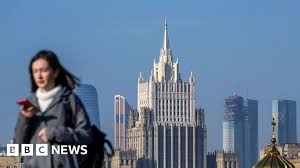
BBC:
Marina, a 45-year-old freelance copywriter, has relied on WhatsApp for her work and personal life for years.
But one day last month that abruptly changed when a call to a colleague did not go through properly. They tried Telegram – another messaging app popular in Russia – but that did not work either.
She was one of millions of Russians facing new restrictions imposed in mid-August by Russia’s media regulator, Roskomnadzor, on calls made through the two platforms – the country’s most popular apps.
The timing coincides with the rollout of a new “national messenger” app known as Max and created by a Russian firm closely controlled by the Kremlin.
Monthly user numbers of WhatsApp and Telegram are estimated to be 97 and 90 million respectively — in a country of 143 million people.
From parents’ chats to tenants’ groups, much of daily life runs through them. WhatsApp – whose owner, Meta, is designated an extremist organisation in Russia – is especially popular with older people because of how easy it is to register and use.

In some parts of Russia, particularly in remote and sparsely connected places in the Far East, WhatsApp is much more than chatting with friends and colleagues. Mobile browsing is sometimes painfully slow, so people use the app to coordinate local matters, order taxis, buy alcohol, and share news.
Both apps offer end-to-end encryption which means that no third party, not even those who own them, are able to read messages or listen to calls.
Officials say the apps refused to store Russian users’ data in the country, as required by law, and they have claimed scammers exploit messaging apps. Yet Central Bank figures show most scams still happen over regular mobile networks.
Telecom experts and many Russians see the crackdown as the government trying to keep an eye on who people talk to and potentially what they say.
“The authorities don’t want us, ordinary people, to maintain any kind of relationships, connections, friendships or mutual support. They want everyone to sit quietly in their own corner,” says Marina who lives in Tula, a city 180km (110 miles) south of Moscow.
She asked us to change her name, worrying that speaking to foreign media can be dangerous.







 Users Today : 234
Users Today : 234 Users Yesterday : 960
Users Yesterday : 960 This Month : 12133
This Month : 12133 This Year : 112511
This Year : 112511 Total Users : 470488
Total Users : 470488 Views Today : 613
Views Today : 613 Total views : 1529181
Total views : 1529181 Who's Online : 4
Who's Online : 4